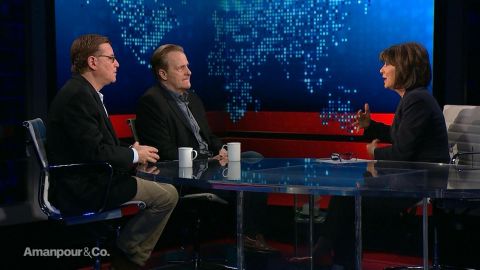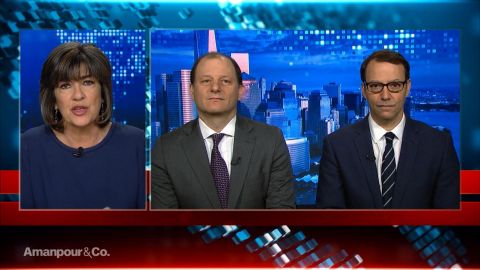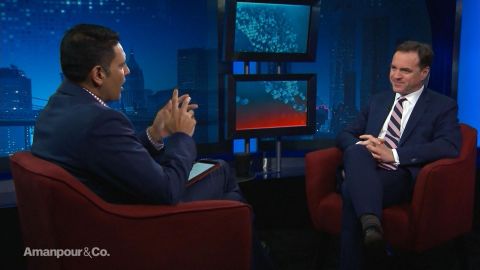Read Transcript EXPAND
CHRISTIANE AMANPOUR: Our next guest, Niall Ferguson, is a best-selling author, historian, and senior fellow at Stanford’s Hoover Institution. In the last 20 years, he’s presented documentaries and written numerous historical tones that chart the rise and fall of western empires. He sits down with our Hari Sreenivasan now to talk about hate crimes rising in America as well as the ongoing China trade talks. But they start their conversation discussing Brexit and why, having voted to remain in 2016, Ferguson now supports leaving the European Union.
HARI SREENIVASAN: From Nigel Farage to Boris Johnson to Liam Fox, it was supposed to be the easiest thing in the world to have a divorce with 27 partners. What went wrong?
NIALL FERGUSON, SENIOR FELLOW, HOOVER INSTITUTION: Well, I did say it wouldn’t be easy. In fact, I wrote just before the referendum in 2016 that it would be like a divorce. And having just gone through one I said with some bitter experience, it will take a lot longer and cost a lot more than you expect. And sure enough so as proved, I was opposed to Brexit. I said this would be a very messy divorce. When the referendum went against my side, I said OK, that’s what you want, best of luck. But, you know, it has gone pretty much as badly as I feared.
SREENIVASAN: So you switched your position on it, why?
FERGUSON: Well, my feeling was that the result of the referendum was a compelling one and I’m not the kind of person who is a bad loser. My feeling was they won and they should then deliver. And there was no point complaining about it. I didn’t want to be classified as a moaner. So my view was all right, that’s what you decided to do. I understand why. And I remember saying this in late 2016, I get why you’re disillusioned with the European Union. I get why, in particular, the migration crisis that the Germans largely caused has led to this shift. I get why you’re frustrated with the way in which European regulations impact the U.K. economy, although I don’t think that is as big a problem as you realize.
And I get why the British public on a whole doesn’t want to be part of a Federal Europe. That had become increasingly become the goal. So I kind of made my peace with it but my sense that it would not be well handled proved to be correct. I think it was mishandled by Theresa May in a number of ways. I’ll mention two. Invoking Article 50, triggering the process before anybody had really figured out what kind of a Brexit it was going to be. Theresa May just went around saying Brexit means Brexit, which is not a particularly compelling tautology. The same mistake with the Collin election and throw away the majority that the Conservatives had won under David Cameron. So those two mistakes have made it almost possible to deliver within the timeframe that began with Article 50.
SREENIVASAN: So what happens then? I mean one extension after another after another. If you carry out this divorce analogy, how many years does this take?
FERGUSON: Well, you know, divorces go on a lot longer than two years in many cases. So it could be that it’s extension, negotiation, extension, negotiation. I could imagine a scenario like that. I can imagine as a result, Brexit never happens or it happens in a very soft form that leaves people who were in favor of Brexit deeply dissatisfied. But my sense is the more important dynamic is going on within British politics. This is an issue that divides both the major parties, Conservative and Labour, but it divides the Conservatives much more profoundly. And the way in which Theresa May has managed the Brexit process has if anything deepened the division. My suspicion is that she will not be prime minister for much long, that there is going to be in relatively short time a leadership election for the Conservatives. And I guess probably a general election more likely than another referendum although who knows?
SREENIVASAN: Yes.
FERGUSON: And that political process is leading in unforeseeable directions. I find it very hard to believe that any Conservative leader is going to win the next general election because the public is thoroughly fed up. Whether they were pro or anti-Brexit, they’re fed up of this protracted and incomprehensible wrangle over minutiae, the backstop, single market, customs union, to Norway. Most people are just fed up with all of this.
SREENIVASAN: Right.
FERGUSON: I think they will punish the Conservatives at the polls, which means ironically that the net result of Brexit could be Jeremy Corbyn, the Labour leader, the most left-wing leader in generations, perhaps ever in the Labour Party’s history becoming prime minister.
SREENIVASAN: Does that mean they’ll just reverse it, have another referendum and they go against the will of the people the first time around?
FERGUSON: Well, here’s where it gets even more bizarre. Because Corbyn himself as an old-guard leftist is in favor of Brexit. He is somebody who is for Brexit for quite different reasons. Conservative Brexiteers have this fantasy that it was going to be free trade Britain doing deals with the U.S. and the kind of Singapore of Europe. If you’re an old Labour socialist, what you really want to do is get out of Europe so you can do socialism and nationalize industries and do the kind of interventions in the economy that European rules don’t allow. So if Corbyn becomes prime minister, he’s going to be in an awkward position. My guess is that he will probably go for a soft Brexit that leaves Britain in the European Customs Union. But that itself won’t solve all of the problems, not at least the problem arising with the Northern Irish backstop. So he’s going to be in almost as difficult a position as Theresa May. In that scenario, Brexit just becomes this endless divorce. Nobody can, in fact, solve the conundrum of Britain’s leaving the European Union. And maybe we will be talking about this issue 10 years from now and there will still be no end in sight to the divorce.
SREENIVASAN: During that process, it seems like there was a disconnect in the sense that there was one conversation happening about GDP and trade and how important everything is and then there was another conversation certainly for the folks who wanted to leave, this is about immigration, this is about sovereignty, this is about a changing landscape so to speak. Those things are still not addressed, right, whether Britain is out or not. I Europe still has to tackle this very large challenge of what to do about immigration.
FERGUSON: I think that’s right. Looking back on 2016, David Cameron and George Osborne wanted to frame the debate about the economic cost of Brexit. And I think ultimately, the projections of those costs will turn out to be roughly right, even if it’s taking a bit longer to happen than was originally said. But actually, I found when I was wandering around provincial Britain talking about this with the people before the referendum, that they really weren’t that bothered by the percentage of gross domestic product that it was going to cost. The attitude I encountered was it’s worth paying that to get out. Because if we stay in, then the problems that are brewing over there, in particular, the migration crisis, which you remember spiked in 2015, ’16 when 1.3 million people or thereabouts came in mostly to Germany, the hardest question that got asked in 2016 in my experience was this. You know those 1.3 million people that the Germans have let in, if they get German passports, can they come here? And it was not possible to say no because given the way in which the European Union works with free movement. If people become German citizens, or for that matter, citizens in other E.U. countries, they do have the right to move to the U.K. It had been the experience of the previous decade that really quite a lot of people have come from the new member states. Poland, for example, or the Baltic States, because the British economy was actually better at generating jobs for migrants than any of the other European economies.
So if you get into the European Union and you want to get employed, it’s perfectly rational to try to get to the U.K. This was the tension I think at the heart of the British situation. The government of 2016 wanted to have a conversation about economic costs. Voters, particularly provincial voters, out there in what you might call Middle England, wanted to have a conversation about immigration.
SREENIVASAN: What about shifting on this side of the pond, “The Washington Post”, they went and looked at a bunch of different counties that had hosted a 2016 Trump campaign rally and they saw a 226 percent increase in reported hate crimes over comparable counties that did not have such a rally. Obviously, that’s not causation but is there something where — obviously, the campaign is not strategically picking up people or counties I should say that have increased numbers of hateful people. Is there a correlation between the messages that are being sent and received?
FERGUSON: Well, I haven’t seen that study so it is hard to comment on it. I mean I think it’s clear that a part of what we might call “Trumpism” is an appeal to activist racist sentiments but I don’t think it is the most important part of Trumpism. And the reason I say that is that the decisive votes that gave Trump the presidency in the states of Michigan, Pennsylvania, and Wisconsin came about when people who had voted for Barack Obama in two elections voted for Donald Trump. Now, that seems to me to run counter to the narrative that Trump is mainly about white supremacy. There’s no doubt that there are some marginal groups of people who believe in white supremacy but what I’m struck by is the tendency of the media to exaggerate the importance of these people and to make assumptions about the attitudes of Trump voters that fit the preconceptions of coastal elites about what really motivated the Trump vote.
SREENIVASAN: How much of that is Trump’s responsibility? In some ways, some of his silence on hateful acts that are happening, either whether they’re from their supporters or even if they’re not. It seems like one of the positions of leadership regardless of where you are in the world is to just call out what is good and what is bad And help signal that to your society.
FERGUSON: Well, I was not a fan of Donald Trump and I found much about his campaign abhorrent. Ours is a mixed-race family. My wife is African. It’s very uncomfortable indeed for me to see race revive as a subject of politics in the United States. But I see it happening on both sides of the political divide. It’s not just this — some elements on the right want to make race an issue. Even at the same time, I am made uncomfortable by the sustained efforts of the progressive left to [13:50:00] make everything about race. I don’t want my boys to think that the most important thing about their lives is that they are of mixed race. And my sense is that both the far-left and the far-right are in a strange dialectal campaign to make everything in American politics about identity. So one can condemn the president for his often distasteful rhetoric but he’s not the only person who’s using a racialized language. It’s happening as much on the left as far as I can see.
SREENIVASAN: Is the appetite that propelled Trump into power, the appetite perhaps for disruption, for really shaking things up, does that keep him in the White House?
FERGUSON: Every political economy model that plugs in variables, particularly economic variables, has Trump being re-elected at this point. And that must come as something of an unpleasant result for the kind of liberal professors who designed these models. So at the moment, you have to ask the question, what could override this pretty fair economic win that he currently enjoys? And it’s a fair win that’s getting fairer in the sense that the federal reserve has signaled a loose monetary policy. So it seems likely that the economy is going to play his way. I think some of the issues that we’ve discussed are relevant. Younger voters, college-educated voters, are quite partially alienated by the president’s style. Women, particularly college-educated women seem likely to be a demographic that he fairs badly with.
The key question when one looks ahead to 2020 is can the Democrats find a candidate capable of defeating the president even if the economy is going his way, at a time when the Democratic Party seems to be moving to the left to the extent that the word socialism has returned to American politics, in a way that I certainly would not have predicted when I first moved to this country? So that is really the question that the Democrats have to grapple with. One last point I will make, if you ask voters around the country what is the most important issue, 40-plus percent say health care. And if you look at the key swing states, the ones that really mattered for Trump in 2016, it’s actually between 44 percent and 49 percent. The Republicans have a huge problem because they now own, health care is an issue, and Americans are deeply dissatisfied on that issue. If Trump ends up having to compete with a relatively centrist Democratic candidate on that kind of terrain, then it may be that the combination of cultural estrangement of educated American voters, of women voters, younger voters, plus this health care issue, to prevent him getting the election. So I would put his probability of re-election at 60 percent right now.
SREENIVASAN: Finally, you were just in China. Americans have started to pay attention to what’s happening with these trade negotiations. What are the Chinese thinking? Is this likely to end soon? And do we both come out winners, losers?
FERGUSON: Win-win is the favorite expression in Beijing. And they still use it when you go to the China Development Forum as I did last week. And their hope is that a trade deal is imminent between the United States and China. And I think President Trump actually wants to do that kind of deal with Xi Jinping. The question is whether the negotiators on the American side and her on the Chinese side can reach an agreement before the two presidents meet. I think they’re going to agree on some things but I don’t think they can agree on everything unless somebody moves really quite a long way in the coming days. So my sense is that there’s going to be a partial but not a comprehensive agreement. And the negotiation on at least some of the issues, data, and enterprises, perhaps intellectual property, will continue. So we might have part one of the trade deal to be followed at some future date by part two. An interesting thing is though that even if there’s a comprehensive trade agreement, there is another conflict between the U.S. and China that isn’t going to go away and that’s what I call the tech war.
The tech war about 5g, about artificial intelligence, that war is not in fact being driven by President Trump. It’s being driven much more by Congress and that isn’t about to stop. Ultimately, we’ve moved from 2016 when we were talking about China in Trump’s terms, about jobs lost from the manufacturing heartland to China to a quite different debate now, which is about national security and China’s potential technological leadership or at least China’s taking American leadership away. Now, that’s a very different debate. And I think that transition from trade war to tech war is the thing to watch.
SREENIVASAN: Niall Ferguson, thanks so much.
FERGUSON: Thank you.
About This Episode EXPAND
Over the past 20 years, Niall Ferguson has presented documentaries and written numerous historical tomes that chart the rise and fall of western empires. He sits down with Hari to talk about the rise of hate crimes in America, the US/China trade talks, and the current state of Brexit.
LEARN MORE


